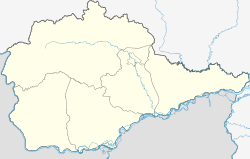Birobidzhan
| city
Birobidzhan
Биробиджан
|
||||||||||||||||||||||||||||||||||||||||||||
|
||||||||||||||||||||||||||||||||||||||||||||
|
||||||||||||||||||||||||||||||||||||||||||||
| List of cities in Russia | ||||||||||||||||||||||||||||||||||||||||||||
Birobidzhan ( Russian Биробиджа́н , Yiddish ביראָבידזשאַן) with 75,413 inhabitants (as of October 14, 2010) is the capital of the Jewish Autonomous Oblast in the Far East Federal District , Russia . It is located on the Amur tributary Bira 172 km west of the city of Khabarovsk .
history
Founded in 1915 under the name Tichonkaya (Тихонькая) and given the status of an urban-type settlement under Stalin on March 28, 1928 , the place was renamed Birobidzhan in 1931 . In 1937 city rights were granted.
The name Birobidschan is derived from the two rivers Bira ( ewenk. For river ) and Bidschan ( camp ), which flow together in this area. The city has a train station on the Trans-Siberian Railway .
Population development
| year | Residents |
|---|---|
| 1939 | 29,648 |
| 1959 | 40,667 |
| 1970 | 55,724 |
| 1979 | 68,630 |
| 1989 | 83,667 |
| 2002 | 77,250 |
| 2010 | 75,413 |
Note: census data
media
In the city appears u. a. Since 1930 the Yiddish-language newspaper Birobidschaner Schtern every day except on Saturdays and Sundays , formerly in two editions in Russian and Yiddish, for some years now only as a bilingual edition. It is one of around 100 Yiddish-speaking media worldwide. During the Soviet era, a magazine was published that was called Najlebn (= " New Life " or "New Beginning") and was intended to attract new settlers. In Najlebn u. a. Poems published by Oleksandr Bejderman . A radio program in Yiddish is also broadcast in Birobidzhan.
Jewish life
Due to the emigration of Jews to Israel and Europe, only a few Jews still live in Birobidzhan. In addition to Russian, Yiddish is also taught in schools. The Jews still living there stated in a survey why they wanted to learn Yiddish, stating that this was the language of their ancestors and that it had to be preserved. Nevertheless, over 80% said Russian was their mother tongue. The Jewish chamber music theater and a Yiddish theater have survived to this day. The people in Birobidzhan live mainly from agriculture and from work in industrial companies (e.g. shoe and stocking factories, agricultural machinery construction Dalselmasch ).
synagogue
In the Soviet Union, practicing religion was made difficult and at times associated with risks. Even so, believing Jews had regularly gathered in private homes for church services since the oblast was founded. However, the community only had a cantor and no rabbi .
The last synagogue burned down in 1950. It was not until the 1980s that a synagogue in a wooden house was inaugurated during a construction campaign in honor of Birobidzhan's 50th anniversary. Most of the old Jews, who were still familiar with their religion, were no longer alive. The synagogue was used for prayer by a Jewish man and several elderly women. However, they worshiped Jesus and were followers of the Seventh-day Adventists .
A newly built synagogue was opened in the 1990s. Rabbi Scheiner, who moved from Israel, has been teaching there for several years. The community has, among other things, a youth organization called Chaverim .
Further educational institutions
- Higher educational institution
- Birobidzhan State Pedagogical Institute
sons and daughters of the town
- Yoel Razvozov (* 1980), Israeli judoka and politician
Climate table
| Birobidzhan | ||||||||||||||||||||||||||||||||||||||||||||||||
|---|---|---|---|---|---|---|---|---|---|---|---|---|---|---|---|---|---|---|---|---|---|---|---|---|---|---|---|---|---|---|---|---|---|---|---|---|---|---|---|---|---|---|---|---|---|---|---|---|
| Climate diagram | ||||||||||||||||||||||||||||||||||||||||||||||||
| ||||||||||||||||||||||||||||||||||||||||||||||||
|
Average monthly temperatures and rainfall for Birobidzhan
Source: Roshydromet
|
|||||||||||||||||||||||||||||||||||||||||||||||||||||||||||||||||||||||||||||||||||||||||||||||||||||||||
See also
literature
- Big politics in the small world of Birobidzhan. Election campaign in the Jewish Autonomous Region in Russia's Far East . In: NZZ , November 24, 2007, Internat. Issue p. 6 (full-page, informative article)
- Antje Kuchenbecker: Zionism without Zion. Birobidžan: Idea and History of a Jewish State in the Soviet Far East. Metropol Verlag, Berlin 2000, ISBN 3-932482-20-4 .
- Matthias Messmer: Stalin's utopian Jerusalem . In: NZZ , October 10, 2013, p. 45.
- Robert Weinberg: Birobidshan. Stalin's forgotten Zion. Illustrated history 1928–1996 . New Critique, 2003, ISBN 978-3-8015-0367-3 .
Web links
- Official website of the city administration (Russian)
- History of the city in the "Electronic Jewish Encyclopedia" (Russian)
- Birobidzhan on mojgorod.ru (Russian)
- Regional editorial office Birobidzhan of the TV channel Rossija 1 (Russian)
- Photos from the early phase of Jewish settlement. Meeting of Frontiers
- Schematic map of Birobidzhan and the surrounding area (Russian)
- Schematic map of Birobidzhan (Russian)
Individual evidence
- ↑ a b Itogi Vserossijskoj perepisi naselenija 2010 goda. Tom 1. Čislennostʹ i razmeščenie naselenija (Results of the All-Russian Census 2010. Volume 1. Number and distribution of the population). Tables 5 , pp. 12-209; 11 , pp. 312–979 (download from the website of the Federal Service for State Statistics of the Russian Federation)
- ^ Matthias Messmer: Stalin's utopian Jerusalem. In: Neue Zürcher Zeitung (online). October 30, 2013, accessed July 6, 2018 .
- ↑ Birobidzhaner Shtern ( Memento from May 10, 2011 in the Internet Archive ) or its Yiddish part ( Memento from May 13, 2011 in the Internet Archive ).
- ↑ Antje Kuchenbecker: No place to stay . In: Die Zeit , No. 41/1993
- ↑ Birobidzhan . hagalil.com; accessed January 15, 2012
- ^ Robert Weinberg: Birobidshan. Stalin's forgotten Zion .
- ^ Gary Matoso, Lisa Dickey: The last Jews of Birobidzhan . ( Memento from August 6, 2007 in the Internet Archive )




